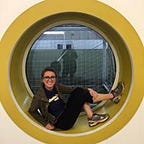Proof of Living
I’m sitting in this café listening to classical music, watching the necks of two tall industrial cranes rise above the shopping center and pass each other slowly. How like a dance they move — almost romantic, gliding with the violin. The wire lines that drip from their angled bodies sway in the breeze and slow until they are perpendicular to the city’s gray sky ceiling.
By the time I left the coffee shop, the two cranes were facing away from one another. I noticed a third crane on the horizon — was this a love triangle? Was I projecting?
My own romantic insecurities imposed on a construction project in Union Square. A new low, maybe, or just one free ticket to the demolition ballet. I spent the bus ride trying not to throw up my coffee and rereading a note I’d saved to my phone the night before.
I had a vague recollection of waking up in the middle of the night with a phrase repeating and pouring from my brain, and I flailed and twitched until I could type it out. In the dream, my mother had it tattooed on her — an irony she will understand when she reads this — and I don’t know what it meant. It said “the limit of my scarless invention is a beautiful scar”. I thought about unbruised babies in white onesies and how we hold them and kiss their little fingernails like they hold all the purity and loveliness in the whole world — scarless.
When I was born, my parents called me their “little loaf of bread” and “peanut butter parfait,” like I was some creamy dessert to be gobbled up. So good you’d lick the plate clean. Before my second birthday, I got some virus from a babysitter who had carelessly left her hands unwashed after a field trip to the petting zoo. Mom recounts the story of our trip to the hospital, my uncharacteristic feistiness toward the nurse, the needle in my foot, and the Styrofoam cup taped over it, a feeble effort to stop me from ripping it out. Perhaps this wasn’t my first scar, but I imagine my parents considered me just a sliver more precious and beautiful than before.
And the same when mom found me in my bedroom one winter, sitting in the dark and letting tears pool onto my sheets. The people who loved me and knew I was hurting tiptoed around me like a museum installation, afraid that any insensitive probing would knock me off my already-teetering pedestal. They could see my scars from behind the glass and regarded me as somehow lovelier with them; I agreed. I reread the sugary poems I’d written when I was in love and determined that teen heartbreak was the only thing that inspired phrases worth sharing.
Nobody drifts through life on Earth without proof of living; I count the bus tickets collecting like dust in my wallet, feel the dip in my nose from a chicken pox scab I couldn’t help but pick. If we are born into a scarless existence, we only become beautiful by way of injury, only emerge as individuals by way of tripping over our own feet, getting lost in the grocery store, cutting our own bangs with dull craft scissors, and eventually throwing our own crystalware hearts at the ground and swallowing up the pieces. Our throats heal along with our stubbed toes and broken skin and mosquito bites. The limit of my scarless invention isn’t a limit after all.
We arrive in the moonlight, bodies bursting with receipts and mismatched memories — we compare stories with the brutal honesty of the bathroom floor, the forgiving tales of the shower drain, the beautiful scars.
Like what you just read? Please hit the ‘recommend’ button and subscribe to our digital magazine about creativity and beyond, Inklings.
